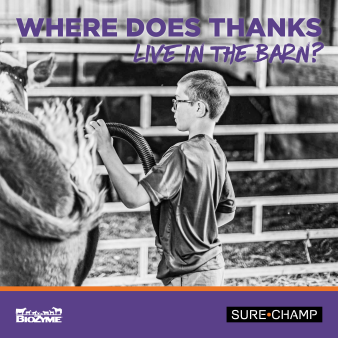
Gastric Ulcers in Pigs
There are a few things more frustrating than having your show animal stop eating. One day, your barrow eats everything you feed it in 15 minutes, during both feedings. The next, it turns up its snout and goes and lays in the fresh shavings.
Gastric ulcers in pigs happen when an area in the stomach lining becomes roughened and eventually erodes; as the erosion worsens, bleeding and perforation can occur.
Causes of Gastric Ulcers in Pigs
Gastric ulcers in pigs are often associated with the stress of rapid growth and gastric hyperacidity, which is why we often find issues in show pig projects. Here are some other common causes:
- Finely ground feed
- Sudden change in feed consistency (pelleted or crumbles to ground feed or vice versa)
- Vitamin E/selenium deficiency
- Excess whey in the diet
- Copper toxicity (excess copper sulfate [more than 250 ppm] to promote growth in pigs up to 100 pounds)
- Roundworm intestinal parasitism
Signs of Gastric Ulcers in Pigs
Of course, the first sign of a gastric ulcer in pigs is that they go off feed. They could go completely off-feed, or they might nibble and move between their feed pan and waterer for a while, trying to decide what to do.
A pig with ulcers will roach its top while standing or be “humped” over. Their stool will be black and tarry. A light-colored pig will “bleach out,” turning pale around the mucous membrane areas of the eyes, mouth and vulva.
Preventing Ulcers in Your Pigs
An ounce of prevention is worth a pound of cure. That is especially true now for show pig enthusiasts who are likely feeding pigs for The Exposition, NJSA Summer Spectacular, the Team Purebred Summer Show, or a State Fair.
Preventing gastric ulcers in pigs involves implementing management practices and dietary strategies to minimize risk factors and promote gastric health. Here are some recommendations to prevent gastric ulcers in pigs:
Provide Adequate Feed and Water
Ensure pigs have access to clean, fresh water at all times. Proper hydration is essential for maintaining gastric health and preventing dehydration-related issues that can contribute to ulcers. Additionally, provide pigs with a balanced diet that meets their nutritional requirements, including sufficient fiber content.
Feed Management
Avoid sudden changes in feed type or diet composition, as this can disrupt gastric function and increase the risk of ulcers. Implement gradual transitions when introducing new feeds or making dietary changes to allow pigs’ digestive systems to adjust gradually.
Reduce Stress
Minimize stressors in the pig’s environment, as stress can intensify gastric ulcer development. Provide adequate space, ventilation and climate to reduce stress and promote pig welfare.
Environmental Management
Maintain clean and dry pens to reduce the risk of bacterial contamination and infections that can contribute to ulcer formation. Proper ventilation and temperature control help create a comfortable environment for pigs and minimize stress-related gastric issues.
Monitor Health & Behavior
Regularly monitor pigs for signs of digestive problems, including reduced appetite, weight loss, lethargy, or abnormal behavior. Early detection of gastric ulcer symptoms allows for prompt intervention and treatment. Besides going off feed, another early sign of gastric ulcers is a vomiting pig.
Veterinary Care for Gastric Ulcers in Pigs
Consult with a veterinarian for guidance on gastric health management and preventive measures tailored to your specific production system. Veterinarians can provide advice on diet formulation, feed additives, and health monitoring protocols to minimize the risk of gastric ulcers in pigs. We can not stress the importance of a veterinarian-client relationship enough.
A local veterinarian is worth creating a good working relationship with, even if you only have show projects 6 months out of the year. Once your vet makes a “barn call,” he or she understands the environment that your animals are housed in, and your management scenario. This will help them to better understand the basic care of the animals and help you provide the best well-being for your animals.
Medication & Supplements
In some cases, veterinarians may recommend the use of medications or supplements to prevent or manage gastric ulcers in pigs. Proton pump inhibitors, antacids or ulcer protectants may be prescribed to reduce gastric acid production and protect the stomach lining.
Amaferm® Can Help
We know that 70% of the immune response is found in the digestive system. If you can keep the digestive system healthy, chances are you can keep your animal healthy. That’s why we power our Sure Champ® products with the AO-Biotics® Amaferm®, a prebiotic research-proven to enhance digestibility.
Giving your pig a Sure Champ product with Amaferm daily can help with its digestive and overall health.
Sure Champ® Extreme with ClariFly®
Sure Champ Extreme with ClariFly is a pelleted, daily supplement for show livestock with ClariFly designed to support hoof health, hair coat and performance when temperatures are above 70 degrees. In addition to Amaferm, it contains MOS to help normalize gut microflora and support the immune system. It also contains HEAT technology, a combination of essential oils and garlic, as well as ClariFly to support animals when heat and insects are a challenge.
Sure Champ® Liquid Boost®
Sure Champ Liquid Boost is a liquid for all livestock designed to provide immediate support to the animal’s digestive and immune system. It also contains Amaferm and MOS to help normalize gut microflora and support the immune system. It contains flavoring to help drive feed and water intake.
“We feed a combination of both the Sure Champ Extreme and Liquid Boost to our pigs all season long, and rarely do we have pigs go off feed. With 10 to 12 pigs coming through our little barn at various times of the year, you would think they would be off and on feed, but they all eat like champs. I credit that to the Amaferm they are getting twice a day. Our barn won’t ever be without it. And we’ll never travel without Liquid Boost and the Sure Champ gels either,” said Shelia Grobosky, BioZyme® Content & PR Administrator, whose family feeds show pigs in Western Illinois.
We don’t sell products we don’t believe in. We trust these products for our animals, and we know they will work for your animals, too.
Get your Sure Champ Products Today
Are you interested in feeding Sure Champ products to your show pigs? Let’s get you started on these products on your pathway to #PreptoWin today!
Sure Champ products are available from BioZyme dealers across the country. Locate your nearest dealer today.
Maybe you would like to purchase the small-pack products online. You certainly can shop our online store.
Become A Dealer
Are you passionate about livestock, and interested in becoming a Sure Champ dealer? Complete our dealer application form.

